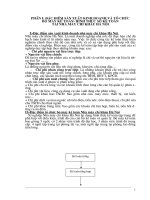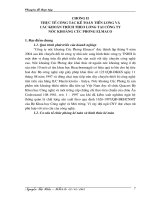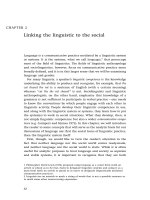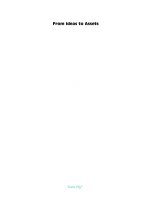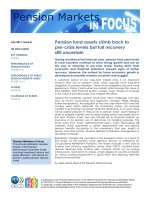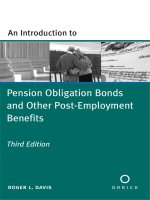R15 linking pension liabilities to assets
Bạn đang xem bản rút gọn của tài liệu. Xem và tải ngay bản đầy đủ của tài liệu tại đây (173.86 KB, 13 trang )
Reading 15
Linking Pension Liabilities to Assets
www.irfanullah.co
Graphs, charts, tables, examples, and figures are copyright 2014, CFA Institute. Reproduced
and republished with permission from CFA Institute. All rights reserved.
Contents
• Introduction
• Asset Only and Liability Relative Perspectives
• Market Related Exposures
• Non-Market Related Exposures
• Liability Mimicking Asset Portfolio
• Conclusion
www.irfanullah.co
2
Introduction
Pension assets exist to defease (offset) pension liabilities
Understand what factors influence pension liabilities and pension assets
Need a framework to model assets and liabilities consistently
www.irfanullah.co
3
Asset Only and Liability Relative Perspectives
We are talking about pension assets and pension liabilities
Asset-only perspective assumes that liability has no market-related exposure
Market-related exposure: exposure that is influenced by market factors such as interest
rates, inflation, economic growth
Table 1
www.irfanullah.co
4
Exhibit 5: Estimated Benefit Payments
People Corporation’s Estimated Future Benefit Payments
(plan does not provide inflation indexing)
Retirees
Deferreds
Active Accrued
Future Wage Inflation
Future Real Wage Growth
Future Service
www.irfanullah.co
5
Inactive benefits due to deferreds and retirees
Need to consider whether benefits indexed to inflation?
Active accrued benefits attributable to past service rendered
and past wages earned
Plan liability = accrued benefits from inactive and active
Future benefits attributable to:
1. Future wage inflation
2. Future real wage growth
3. Future service
Future benefits impact pension liability in the long-term, not
the short term
www.irfanullah.co
6
Table 2. Market Related Exposure and Liability Mimicking Assets
www.irfanullah.co
7
Non-Market Related Exposures: Liability Noise
Actuaries create models to predict future obligations. Models rely on assumptions,
statistics and probabilities.
Two components of liability noise:
Plan demographic experience different from actuarial model.
Model uncertainty. Larger population model uncertainty becomes less
For inactive participants major noise source: mortality assumption. Longevitiy risk.
For active participants also worry about:
assumptions of withdrawals
disability
retirement
Hence, liability noise for active participants > liability noise for inactive participants
www.irfanullah.co
8
Linking Assets and Liabilities via Fundamental Factors
To hedge a liability you need an asset which is influenced by the same underlying economic
and fundamental factors
Bond liability depends on discount
rate. Hence the relevant factors are:
Real rate
Inflation
Bond premium
Economic and fundamental factors
underlying cash flows provided by
assets are:
Real rate
Inflation
Risk premia
Future wage liability depends on:
Inflation
Economic growth
For equity also consider:
Economic growth
www.irfanullah.co
9
Table 5. Correlations for a an entity where accrued benefits are not inflation indexed
Liability Mimicking Asset Portfolio: Nominal Bonds: 85%, Real Rate Bonds: 5%, Equities: 10%
This can be thought of as the benchmark portfolio
www.irfanullah.co
10
Example: Liability Mimicking Approach
For a hypothetical company, components of estimated future benefit payments after 20 years:
Liability Exposure
Amount of Payment
Retirees
20
Deferreds
10
Active Accrued
18
Future Wage Inflation
12
Future Real Wage Growth
4
Company pays cost of living adjustment on retiree
pension payments…but only for those who have
retired.
Half of future wage inflation correlates closely to
CPI and half of the future real wage growth is
assumed to correlate closely with domestic
securities.
Inflation indexed bonds:
Nominal bonds:
www.irfanullah.co
11
Pros and Cons of Liability Mimicking Portfolio
Benefit: Low Risk
However, will not get return in excess of liability
Expensive to maintain in the long-run
Recommendation:
1. Hedge Liability (ties up less capital)
2. Focus remaining capital on efficient return generation
This is still a liability relative approach and often leads to investment policies other than
the traditional asset-only approach (60% - 70% equities)
www.irfanullah.co
12
Conclusion
• Asset-Only Approach
• Liability-Relative Approach
• Fundamental and Economic Exposures of Pension Liabilities
• Non-Market Exposures
• Do the Practice Problems!
www.irfanullah.co
13
